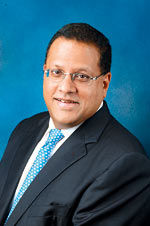Public debt and bonds out of Central Bank control

Arjuna Mahendran
Key functions of the Central Bank (CB) are to removed from the banking regulator under a proposal of the Ministry of Policy Development and Economic Affairs. The Department of Exchange Control, the Employees Provident Fund, the Staff Training College (based at Rajagiriya) and the Public Debt Department will come under independent agencies operating under the purview of the Prime Minister’s office, under a proposal presented to the Cabinet, about two weeks back. At the same time, the Prime Minister’s Ministry had also recommended the re-appointment of Mr. Mahendran for a new 6-year term which starts on 1st July 2016, the Business Times reliably understands.
However other events have now overtaken the PM’s decision with growing demands over the past few days against Mr. Mahendran’s re-appointment gathering momentum and culminating with a rumbustious protest campaign by the joint opposition on Friday. On Friday, Mr. Mahendran informed the CB’s Monetary Board that he won’t be seeking re-appointment until a Parliamentary Committee on Public Enterprises (COPE) probe into the tainted bond issues is completed. The United National Party section of the government is hoping that the COPE report will be presented to Parliament before June 30, and also that Mr. Mahendran would be cleared of any wrongdoing.
However COPE Chairman Sunil Handunetthi told the Business Times that there is no relevance between the COPE review which deals with 20 state organisations including the CB and Mr. Mahendran’s re-appointment. “We are examining the bond issues and whether there were any irregularities,” he said adding that in any event, it is unlikely that the COPE report would be ready before June 30 (the day Mr. Mahendran’s term ends) since the Auditor General (AG)’s report is yet to be received. At the last COPE sitting on June 8, the Governor and Deputy Governor P. Samarasiri came under fire over their refusal to allow the AG access to information pertaining to Treasury bond sales.
However they agreed to submit the information by June 15. The Governor has denied any wrongdoing in a February 2015 bond deal which drew allegations that his son-in-law’s family firm, Perpetual Treasuries had unduly benefited from inside information. Informed sources said that the move to remove public debt from the control of the CB was in support of Mr. Mahendran’s re-appointment, a decision that now lies in the hands of President Maithripala Sirisena, the appointing authority, who is under pressure from his own Sri Lanka Freedom Party members in the cabinet who are opposing Mr. Mahendran.
“Bonds come under the public debt department and such a move would have cleared Mr. Mahendran of any future issues pertaining to bonds,” one source said, explaining the rationale in removing public debt from the CB. The move is similar to the CB being brought under the supervision of the PM last year instead of the usual Finance Ministry, to remove any conflicts of interest since Minister Ravi Karunanayake had some court cases pertaining to exchange control.
| Central Bank – events likely to follow | |
| When the Monetary Board met on Friday morning, Central Bank Governor Arjuna Mahendran announced that he was not seeking re-appointment until he was cleared by a Parliamentary committee looking into tainted Treasury bond issues. According to informed sources, he had then suggested that Deputy Governor P. Samarasiri should be appointed as acting Governor until a new Governor is appointed. However Deputy Governor Dr. Nandalal Weerasinghe, who is more senior than Mr. Samarasiri, pointed out that the Monetary Law doesn’t have provision for an ‘acting’ appointment once the Governor’s term is over, an issue that was earlier reported by the Business Times. The paper has said that provision for an ‘acting’ appointment is permissible only when the governor goes on leave or is overseas, not when the CB doesn’t have a governor. Section 24 of the Monetary Law states that: “In the event of the temporary absence from duty of the Governor or of the temporary inability of the Governor to perform his functions and duties, the Deputy Governor designated as senior by the board shall act as the chief executive officer of the Central Bank and shall have authority to execute the powers and perform the functions and duties of the Governor under this Act.” This also means the President will be compelled to appoint a new Governor before June 30 (since the Governor’s assent and signature may be required for important daily business) and dashes any hopes of Mr. Mahendran being appointed at a later date. “The only way Mr. Mahendran can return is if a nominal appointment is made (from July 1 onwards) and that individual (by prior agreement) resigns if Mr. Mahendran is cleared of wrongdoing and the latter is (to be) re-appointed,” one source said, adding however that the problem, in this instance, would be if the new appointee refuses to step down. |


